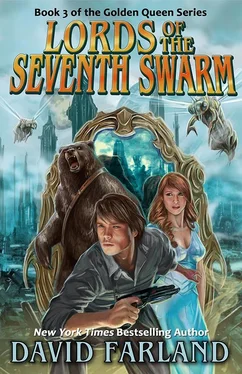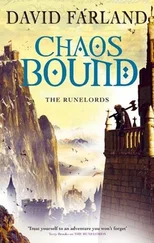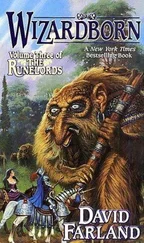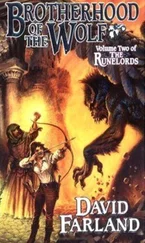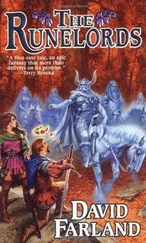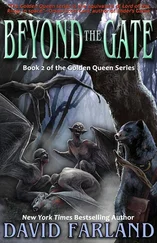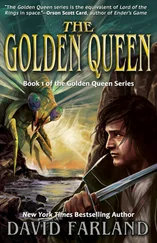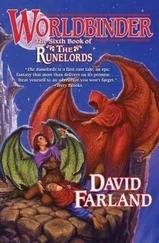David Farland - Lords of the Seventh Swarm
Здесь есть возможность читать онлайн «David Farland - Lords of the Seventh Swarm» весь текст электронной книги совершенно бесплатно (целиком полную версию без сокращений). В некоторых случаях можно слушать аудио, скачать через торрент в формате fb2 и присутствует краткое содержание. Жанр: Фантастика и фэнтези, на английском языке. Описание произведения, (предисловие) а так же отзывы посетителей доступны на портале библиотеки ЛибКат.
- Название:Lords of the Seventh Swarm
- Автор:
- Жанр:
- Год:неизвестен
- ISBN:нет данных
- Рейтинг книги:3 / 5. Голосов: 1
-
Избранное:Добавить в избранное
- Отзывы:
-
Ваша оценка:
- 60
- 1
- 2
- 3
- 4
- 5
Lords of the Seventh Swarm: краткое содержание, описание и аннотация
Предлагаем к чтению аннотацию, описание, краткое содержание или предисловие (зависит от того, что написал сам автор книги «Lords of the Seventh Swarm»). Если вы не нашли необходимую информацию о книге — напишите в комментариях, мы постараемся отыскать её.
Lords of the Seventh Swarm — читать онлайн бесплатно полную книгу (весь текст) целиком
Ниже представлен текст книги, разбитый по страницам. Система сохранения места последней прочитанной страницы, позволяет с удобством читать онлайн бесплатно книгу «Lords of the Seventh Swarm», без необходимости каждый раз заново искать на чём Вы остановились. Поставьте закладку, и сможете в любой момент перейти на страницу, на которой закончили чтение.
Интервал:
Закладка:
The sounds softened, almost breathless, and Gallen suspected this recording recounted the tale of these two Qualeewoohs. It must have been an epic battle, for it lasted more than ten minutes, and Gallen was astonished at what he saw-Qualeewoohs flying in complex loops, twisting dives, terrifying strikes and heroic dodges.
In the end, one Qualeewooh plummeted in a dazzling pattern, as if trapped in a whirlwind, spiraling down. In the last second of its attack, it reached out with one wing, where its tiny hand carried a thin blade, and smote off the head of its adversary.
Thus the adversary tumbled to earth, end over end, its head somersaulting in the air.
The vanquishing Qualeewooh soared on over the plains, master of all it surveyed.
For the next several minutes of the recording, all one could see was a lone Qualeewooh flying through endless empty skies, accompanied by a ringing song that could only have come from some type of pipes or whistles, unaccompanied by other instruments, until at last the remaining Qualeewooh reached a mountain aerie and entered a cave.
In the back of the cave, Qualeewooh chicks huddled in downy feathers, shaking amid the shells of their eggs, snaking querulous peeps as the dark lord approached, beak open, displaying his razor-sharp teeth.
There the tale ended.
Gallen’s logic told him that this recording showed a major battle between good and evil. If so, something was certainly amiss. This was not a heroic tale as he understood it: of the Qualeewoohs who had fought, the loser was not the aggressor, but the defender. The defender, a smaller Qualeewooh, had worn a simple spirit mask of bright silver, unadorned with any gaudy stones. In all the encounters, it had heeled away, retreating with great speed and desperation toward a distant line of hills. True, it did rake its attacker on occasions, but only in self-defense.
And the song, the strange song at the end that sounded like reed pipes, seemed to Gallen not to be trumpeting victory, nor sounding an anthem of peace.
Instead, it was a bewailing tune, a howling . I am the dark god of the skies , the icon had cried. Through victory I am diminished.
When Felph’s spindles reached the lowest bottom corners of the panel, the song ended. The glass statue receded down into the floor, where the stone doors slid back in place with a snick.
Felph turned around, pocketed the devices that let him play the recording.
Gallen stood in the solemn chamber, with his friends around him. Beside him he could feel Maggie standing close, shivering from fear. Gallen remained utterly silent, the alien music ringing through his head. No one spoke. No one wanted to be the first to break the spell the Qualeewooh music had woven. The whole battle, the symbolism, was utterly alien. But Gallen felt that, somehow, he understood.
He wondered how this cave had appeared to the Qualeewoohs, thirty thousand years ago: many nesting sites had probably been here in the cliffs. The chicks would have come into this cave, in the darkness, Gallen imagined. Perhaps the chicks would have been small, so young they hadn’t grown their adult plumage. So they would have been ugly, gangling things with small wings and large heads.
A priestess would have stood before the platinum panel and waved her wings, as if taking flight. Immediately the dark god would rise behind her, its malevolent intent glowing in its eyes. Each chick would have had its head turned to the side, gazing at the dark god with one eye only. Perhaps the victim of the murder symbolized the priestess in her flight. That sounded somehow right.
Gallen realized that the defender in the battle had been lighter of color. Female, perhaps? The death of virtue, the end of civilization. That’s what the dark god brought.
He stared at the scene in his imagination, lost in thought, until Felph said quietly, “I first came to Ruin nearly seven hundred years ago, as an archaeologist. I was part of a team that discovered this site. All the others, they’ve moved on to other worlds, other ruins. But I’ve stayed to study the Qualeewoohs and their civilization.
“You see, they are not unlike us. Their ancestors were violent hunters, lords of the skies. They traveled in great flocks that darkened the heavens. When they descended on the twisted jungles, they carried off what they desired.
“And like our ancestors, they grew to be too numerous, and began to war.
“But they were not really like us,” Felph mused, and his tone was somber. He stared at the floor, his dark eyes unfocused, his gaze directed inward.
“Man was content to live with war, and even gloried in it. But the Qualeewoohs never romanticized it, never saw it as a necessity, nor even really tolerated it. “
“What happened to them, then?” Orick asked, his deep voice full of awe. “Why did they die out?”
“They haven’t, as I said,” Felph answered. “But if our astrophysical models are correct, things here changed about thirty thousand years ago, during the fourth expansion. Ruin circles a small sun, as you can see-one too small to regularly burn away the planet’s polar ice caps. Darksun drew close to its larger sister every six years in a very elliptical orbit, and when the suns reached perigee, the combined light provided enough heat to melt the polar caps here on Ruin. With this melting, water would fill the shallow seas, and as the tangles enlarged, the local flora and fauna populations would explode for a few years.
“But about twenty-eight thousand years ago, something changed the orbits. It may have been that a large planetary body passed through the system, or even hit Darksun, skewing its orbit, making it more and more elliptical. On a cosmic scale, the variations in orbit appear minor, but the changes here on Ruin have been dramatic.
“The result has been that the six-year cycle now takes three hundred years to complete. The free water here on Ruin is becoming more and more concentrated at the poles, and now, even when the ice caps do melt, they can’t melt completely.”
“So the Qualeewoohs died out?” Maggie asked.
“No, not exactly,” Felph said. “Their numbers were on the decline even before this tragedy. That is what intrigued me about them you see, Qualeewoohs are intelligent creatures-smarter than the average human who isn’t genetically enhanced.
“No, they weren’t dying out. What happened is this: in the early days of human technology, our ancestors’ innovations concentrated in several areas-the production of shelter, transportation, food, and weapons of war.
“But the Qualeewoohs never needed these. They needed no transportation. Because they were winged creatures, they were free to hunt and move at will. Indeed, I can find no evidence that, outside of litters for carrying their sick, the Qualeewooh ever created any kind of vehicle.
“As far as shelter goes, their needs seemed minimal. The Qualeewoohs, unlike humans, cannot live in extreme cold. Their wings and necks dissipate too much heat, so they were never free to expand beyond their lower temperate regions. Nor can they nest near the tangles, where predators steal their eggs. So they nest in mountainous areas above the tangles-and there were plenty of nesting sites.
“Also, the Qualeewoohs, unlike humans, are pure carnivores. The ancients did develop methods of ranching-controlling predators and unwanted herbivores. The tangles provided them with hundreds of different natural pesticides and whatnot. But because the Qualeewooh are carnivores, their numbers naturally stabilized at smaller populations than human populations would. Indeed, food became the predominant limiting factor in their expansion.
“But war, of course, was their big problem. When driven by hunger, Qualeewoohs engaged in the worst sort of cannibalism. A well-fed Qualeewooh is a magnificently moral creature, but when a Qualeewooh starves, when its brain suffers from a lack of sugars, it enters a dark state that the Qualeewoohs call ‘The Voracion.’ A Qualeewooh, so afflicted becomes a terrible, mindless predator-slaying anything but its own mate in an effort to survive. Thus, starving adults would forage into the nesting territories of enemy flocks, slaying the females, eating eggs and chicks. In lean years, terrible things happened.”
Читать дальшеИнтервал:
Закладка:
Похожие книги на «Lords of the Seventh Swarm»
Представляем Вашему вниманию похожие книги на «Lords of the Seventh Swarm» списком для выбора. Мы отобрали схожую по названию и смыслу литературу в надежде предоставить читателям больше вариантов отыскать новые, интересные, ещё непрочитанные произведения.
Обсуждение, отзывы о книге «Lords of the Seventh Swarm» и просто собственные мнения читателей. Оставьте ваши комментарии, напишите, что Вы думаете о произведении, его смысле или главных героях. Укажите что конкретно понравилось, а что нет, и почему Вы так считаете.
